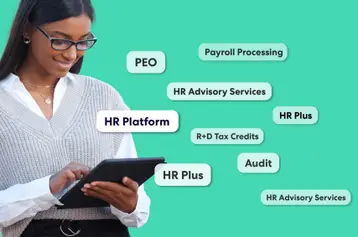The Impact of PEO Engagement on Business Survival: Why Companies Using PEOs Are More Likely to be Resilient

Table of contents
- 1.Understanding PEOs and Their Role in Business Administration
- 2.Key Findings: The Double Benefit of PEO Engagement
- 3.Why PEO Clients May Have Higher Survival Rates
- 4.Compliance Support and Risk Mitigation
- 5.Enhanced Focus on Core Business Functions
- 6.Economic Stability Through Scalable Solutions
- 7.Matching Methodology: Making a Similar Comparison
- 8.Real-World Implications: How PEO Engagement Translates to Business Success
- 9.Case Study: An Example of PEO-Driven Resilience
- 10.Addressing Potential Limitations in the Study
- 11.Looking Forward: The Future of PEOs in Business Strategy
The resilience of small and medium-sized businesses is often tested by various economic and operational challenges. However, new data suggests that businesses working with Professional Employer Organizations (PEOs) experience significantly higher survival rates compared to their counterparts. According to research conducted by McBassi & Company for the National Association of Professional Employer Organizations (NAPEO), businesses that work with PEOs are half as likely to go out of business within a three-year period. This article delves into the reasons behind this phenomenon and the methodologies used in the research.
Understanding PEOs and Their Role in Business Administration
PEOs provide comprehensive HR solutions for small and medium-sized enterprises (SMEs), covering services such as payroll, employee benefits, tax administration, and compliance. By outsourcing these tasks to PEOs, business owners can focus on core activities like growth strategies and customer service. The increased administrative efficiency and the ability to navigate compliance helps businesses allocate resources more effectively and adapt more swiftly to changing market conditions.
Key Findings: The Double Benefit of PEO Engagement
The research revealed that businesses utilizing PEO services tend to be more resilient, with survival rates approximately double those of non-clients. When McBassi & Company converted the three-year corporate survival rates into one-year rates, the results still showed a marked difference in favor of PEO clients.
According to the study, the adjusted survival rate for non-PEO clients was calculated using a combination of direct survival rates for PEO clients and an estimate for the matched businesses, which included companies of unknown PEO status. The research estimated that about 17% of these matched companies were likely PEO clients, while 83% were not.
Why PEO Clients May Have Higher Survival Rates
The data shows we can better outline the impact that a PEO has directly affecting the success of small to medium-sized businesses.
Access to Comprehensive Employee Benefits and HR Expertise
PEOs provide access to robust employee benefits packages that small businesses may not be able to offer on their own. This can enhance employee retention and morale, which are critical for maintaining operational stability. According to McBassi & Company, "Businesses that partner with PEOs often see reduced employee turnover rates, leading to cost savings and consistent workforce productivity." This HR stability can directly enhances business resilience.
Compliance Support and Risk Mitigation
Navigating the labyrinth of employment-related rules and regulations can be daunting for small businesses. PEOs provide expertise on these rules and requirements, helping businesses navigate compliance and mitigate risks that could lead to costly penalties. McBassi & Company noted that "PEO clients benefit from expert guidance in compliance, which helps avoid disruptions that could otherwise threaten business continuity."
Enhanced Focus on Core Business Functions
By outsourcing HR and administrative tasks to PEOs, business owners can dedicate more time to strategic growth initiatives. The ability to focus on revenue-generating activities rather than internal processes can significantly enhance a company's agility and market responsiveness.
Economic Stability Through Scalable Solutions
PEOs offer scalable HR solutions that can adapt to the growth trajectory of a business. This means that as companies expand, their HR needs can be met without the usual growing pains associated with rapid scaling. McBassi & Company highlighted that "the scalability of PEO services allows businesses to adjust more effectively during economic fluctuations, which contributes to higher survival rates."
Matching Methodology: Making a Similar Comparison
To provide a robust comparison, the researchers carefully matched PEO clients with non-client companies based on several criteria:
- Industry: Focusing on companies who operate in the same sector helps to reduce discrepancies related to industry-specific survival rates.
- Employee Size Group: Matching companies based on similar employee counts can prevent skewing results due to the advantages or challenges associated with company size.
- Location: By comparing businesses within the same state, the research accounted for differences in state-level economic conditions and business regulations.
The use of these matching criteria was crucial to isolating the impact of PEO engagement on business survival, making the results of the study more reliable.
Real-World Implications: How PEO Engagement Translates to Business Success
For business owners, especially those managing small and medium-sized enterprises, the implications of this research are clear. Working with a PEO can not only help simplify HR management but also provide a better safety net that can significantly help reduce the likelihood of business closure. In an unpredictable economic landscape, the stability offered by PEOs can be the difference between thriving and shuttering operations.
Case Study: An Example of PEO-Driven Resilience
Consider a small manufacturing firm based in California with around 50 employees. In 2020, amid the economic disruptions caused by the COVID-19 pandemic, the company faced significant challenges in managing its workforce and navigating compliance with rapidly changing mandates. By engaging a PEO, the business was able to streamline payroll processing, access best practice guidance on new workplace safety protocols, and provide employees with access to comprehensive benefits. As a result, not only did the company retained their workforce, but it also grew by about 20% over the next two years.
Addressing Potential Limitations in the Study
While the research provides compelling evidence of the benefits associated with PEO engagement, some limitations must be acknowledged:
PEO Status Uncertainty: In the comparison group of matched companies, the PEO status of some firms was not definitively known. While the research estimated that 17% of this group were likely PEO clients, the lack of concrete data introduces some margin of error.
Economic Variables: Factors such as local economic conditions, industry growth trends, and access to capital could also influence survival rates, although matching criteria helped to minimize these effects.
Looking Forward: The Future of PEOs in Business Strategy
The findings from McBassi & Company's research underscore the strategic value of PEOs, especially in times of economic uncertainty. As businesses continue to face challenges such as talent shortages, regulatory changes, and evolving workplace norms, PEOs are likely to play an even more crucial role in business resilience.
The evidence supporting PEO engagement as a pathway to higher business survival rates is strong, indicating that PEOs can be a valuable provider for companies seeking not only growth but also long-term stability. By leveraging the expertise, resources, and support provided by PEOs, businesses can position themselves for success in an ever-changing market landscape.
In conclusion, the research by McBassi & Company provides compelling data showing that businesses working with PEOs are less likely to shutter. The combination of access to employee benefits, compliance support, and the ability for businesses to focus on core operations creates a powerful framework for sustained growth and resilience. As more businesses recognize the advantages of PEO engagement, the trend of higher survival rates among PEO clients is expected to continue, helping to establish a newer standard for business longevity.
This communication is for informational purposes only; it is not legal, tax or accounting advice; and is not an offer to sell, buy or procure insurance.
This article may contain hyperlinks to websites operated by parties other than TriNet. Such hyperlinks are provided for reference only. TriNet does not control such web sites and is not responsible for their content. Inclusion of such hyperlinks on TriNet.com does not necessarily imply any endorsement of the material on such websites or association with their operators.

TriNet Team
Table of contents
- 1.Understanding PEOs and Their Role in Business Administration
- 2.Key Findings: The Double Benefit of PEO Engagement
- 3.Why PEO Clients May Have Higher Survival Rates
- 4.Compliance Support and Risk Mitigation
- 5.Enhanced Focus on Core Business Functions
- 6.Economic Stability Through Scalable Solutions
- 7.Matching Methodology: Making a Similar Comparison
- 8.Real-World Implications: How PEO Engagement Translates to Business Success
- 9.Case Study: An Example of PEO-Driven Resilience
- 10.Addressing Potential Limitations in the Study
- 11.Looking Forward: The Future of PEOs in Business Strategy






